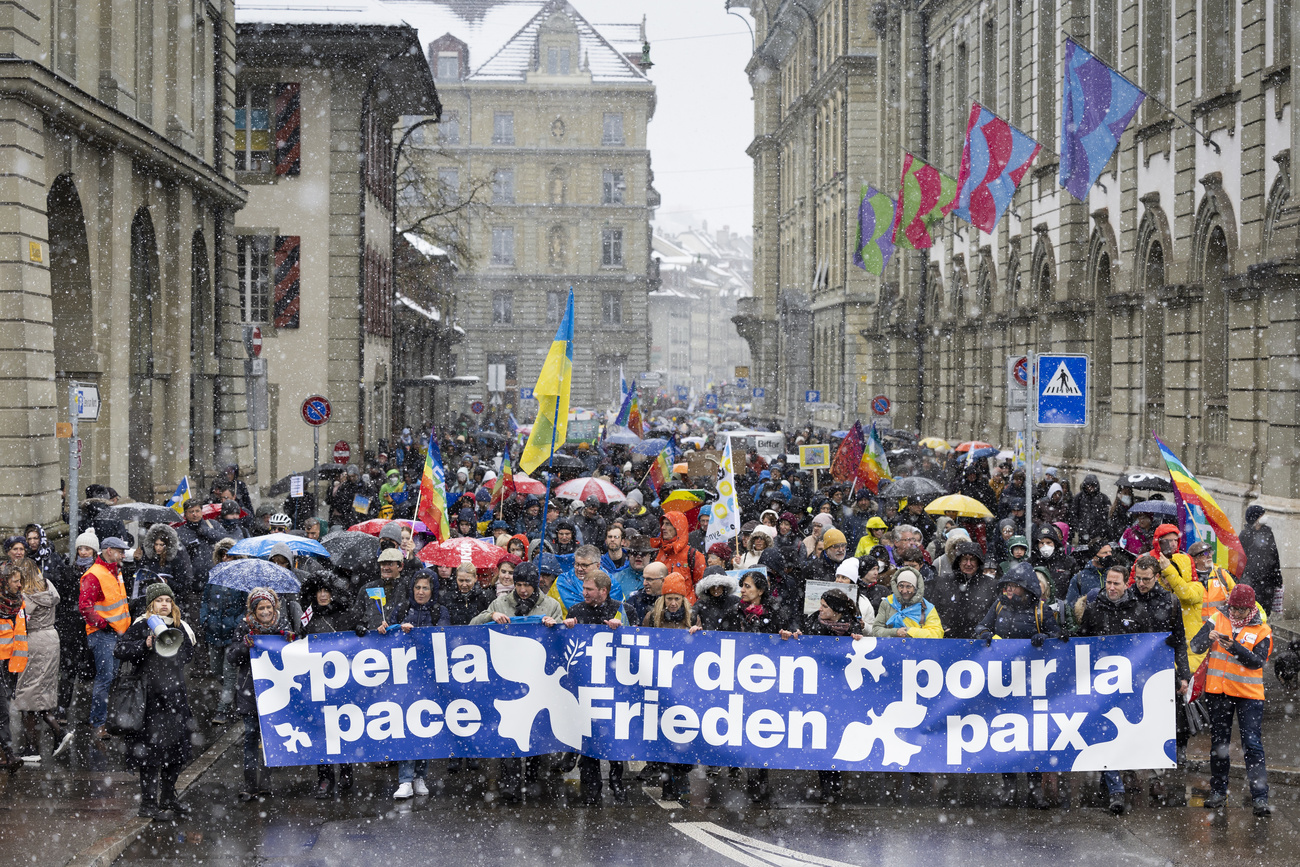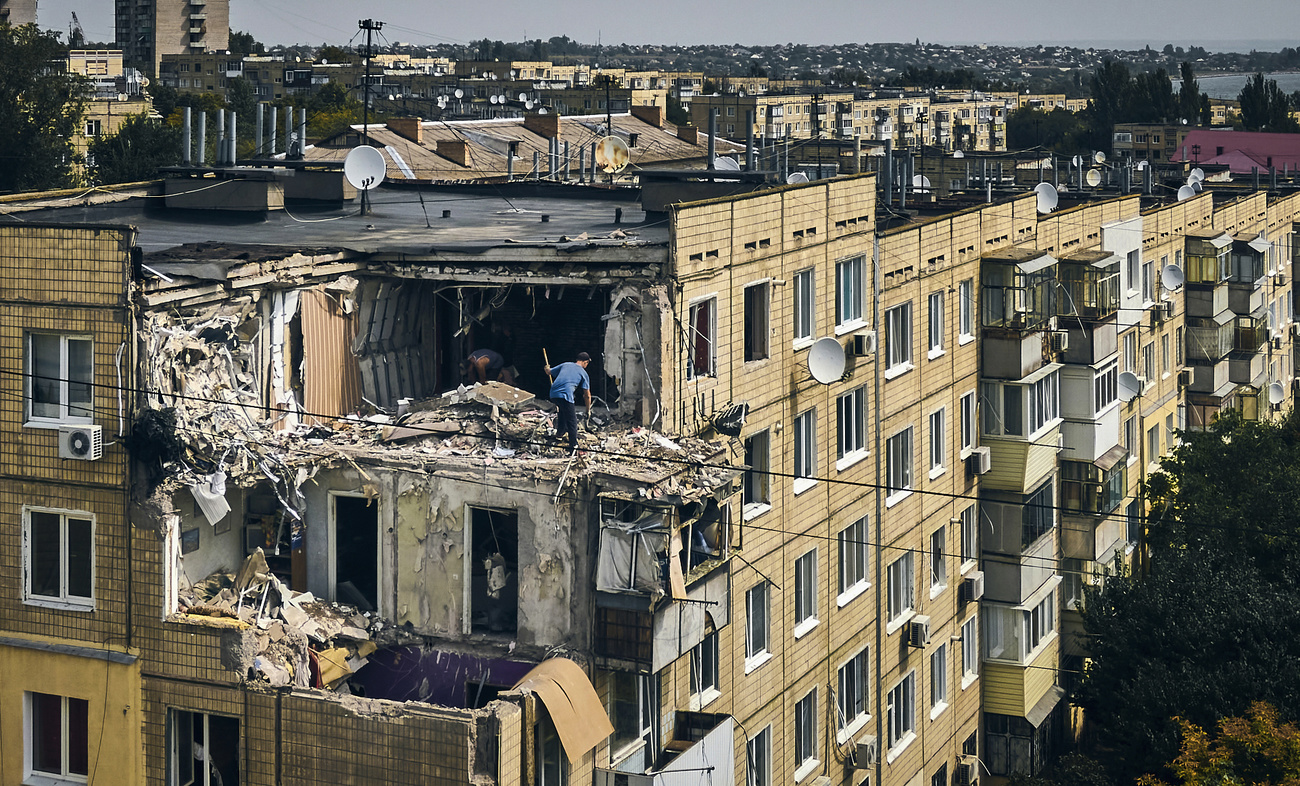War in Ukraine splits peace movement

Pacificist organisations in Switzerland want, evidently, nothing but peace in Ukraine. But opinions differ about the best way to achieve this.
The Swiss Peace Movement (also known by its German acronym, SFB) is a relatively small organisation. Yet it seems to have sparked a heated debate about what working for peace actually means.
Unlike other pacifist movements, the SFB has not only taken a stand against arms deliveries to Ukraine – it also believes that imposing sanctions against Russia is the wrong approach.
“More weapons do not lead to a quick victory,” says Tarek Idri, a representative for the organisation. “They just prolong suffering on both sides.” Nor are sanctions an effective means of achieving peace, he adds. Unilateral coercive measures of this kind violate international law and are incompatible with the Swiss principle of neutrality.
“It is unlikely that Russia will continue to regard Switzerland as a viable mediator after this,” Idri predicts. But above all, the peace activist decries the fact that “sanctions always hit the poorest people in a country hardest.” This is true not just for the Russian population, but for people in many other countries too.
The SFB is getting a lot of pushback for its stance. Internally, however, its members are more united and determined than ever. According to Idri, membership numbers have not changed and are still in the hundreds range, but individual motivation to take action for peace has grown noticeably in recent months.
“The ultimate goal for all of us is de-escalation,” he says. “However, this can only be achieved with a ceasefire and negotiations.” Heavy weapons and sanctions will simply aggravate the situation. “Peace and security in Europe can only be reached together with – and not against – Russia.” Idri finds it problematic that some peace activists are advocating for supplying Ukrainians with heavy weapons.
“Of course we want to continue working with these organisations, but we are dismayed by this attitude,” he says.
Disagreements over arms deliveries
By “these organisations”, Idri primarily means the Group for a Switzerland without an army, which also goes by its German acronym GSoA. With around 24,000 members and sympathisers, it is by far the largest pacifist organisation in the country. It has attracted several hundred new supporters, including many young people, in recent months.
Anja Gada, a member of the GSoA secretariat, sees no contradiction in the fact that many of the group’s members are so clearly in favour of arms deliveries to Ukraine. There have always been different positions on this issue within the group, she points out. While some reject the use of armed force outright, others believe that individual circumstances have to be taken into account. In the case of a direct attack like the Russian invasion of Ukraine, the right to self-defence must be acknowledged.
“Our focus is on prevention,” says Gada. “We work to ensure that there is no escalation in the first place.” But if a conflict has already broken out, then the starting point is completely different.
For the GSoA, Swiss support for Western sanctions against Russia is the right course of action. “Diplomatic negotiations are valuable and important,” says the activist. “But Switzerland must not hide behind its role as a mediator.” Doing nothing in the current conflict would violate the country’s principle of neutrality just the same.
In Gada’s view, Switzerland should be more decisive in its role as a commodity trading and financial hub for Russian companies and oligarchs. Far too much responsibility is being shifted onto the cantons when it comes to freezing assets or blocking transactions. And it is precisely these funds that are financing the current war.
“This is by far the biggest and most important lever that Switzerland has for contributing to peace in Ukraine,” she points out.
Gada also criticises Switzerland’s centre-right parties for instrumentalising people’s fears in order to push ahead with re-armament projects, such as the purchase of F-35 fighter jets. The government’s rhetoric has also changed since the war, she says. It promises that the fighter jets will make the country safer, yet the security situation in Switzerland has not changed since Russia’s war of aggression. Russian troops crossing onto NATO territory, on the other hand, would trigger a nuclear world war.
“And then even three dozen new fighter jets would not help us,” she says.
Fossil fuels are part of the problem
The Ukraine war and the global pandemic before that have pushed international climate movements Fridays for Future and the climate strike out of the Swiss media spotlight. “Yet the climate crisis is more present today than ever,” says activist and climate strike spokesperson Cyrill Hermann.

There is hardly a newspaper or television report on any topic that does not mention global warming or energy at least in passing. This is also true, and perhaps even more so, of the coverage of the Ukraine crisis and the related debate about Russian natural gas.
“The war confirms that we are doing the right thing in committing to renewable energies,” Hermann believes. “Fossil fuels are also not the solution from a peacebuilding perspective.”
The climate activist is also convinced that demonstrations, despite no longer drawing the same media interest as it did before the war and the coronavirus, still provide a space where people can talk to others and where many decide to become more active in climate protection. “We are especially pleased to see that Ukrainian activists from Fridays for Future who have fled their country have now also joined our regional groups.”
All of this begs the question of whether the movement can still make its concerns heard through demonstrations, or whether more acts of civil disobedience – like the recent occupation of the main square in front of the federal parliament in Bern – would not be more effective at drawing attention to the urgency of the climate situation. According to Hermann, there are probably several thousand activists nationwide who regularly take part in meetings and events. This is a decrease compared to two or three years ago, but that is not necessarily a bad thing.
“Many activists overstretched themselves at the beginning,” he says. It is also a sign of self-care that some of them have now shifted down a gear.
Translated from German by Julia Bassam/gw

In compliance with the JTI standards
More: SWI swissinfo.ch certified by the Journalism Trust Initiative











You can find an overview of ongoing debates with our journalists here . Please join us!
If you want to start a conversation about a topic raised in this article or want to report factual errors, email us at english@swissinfo.ch.